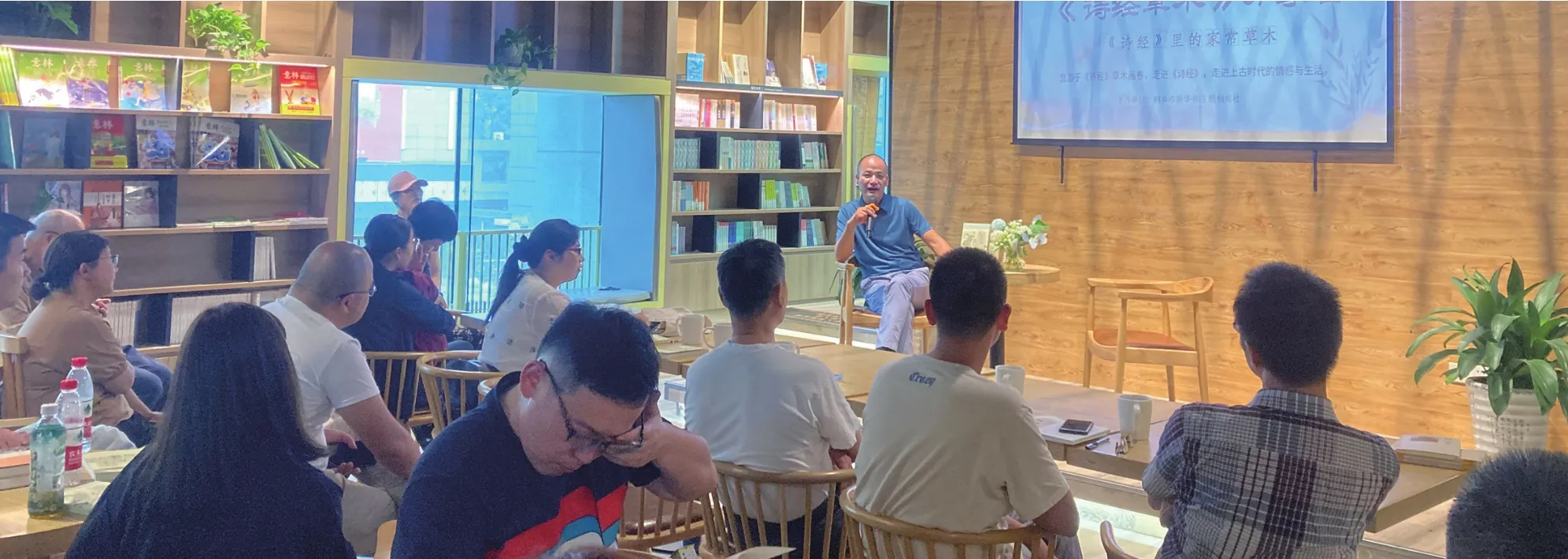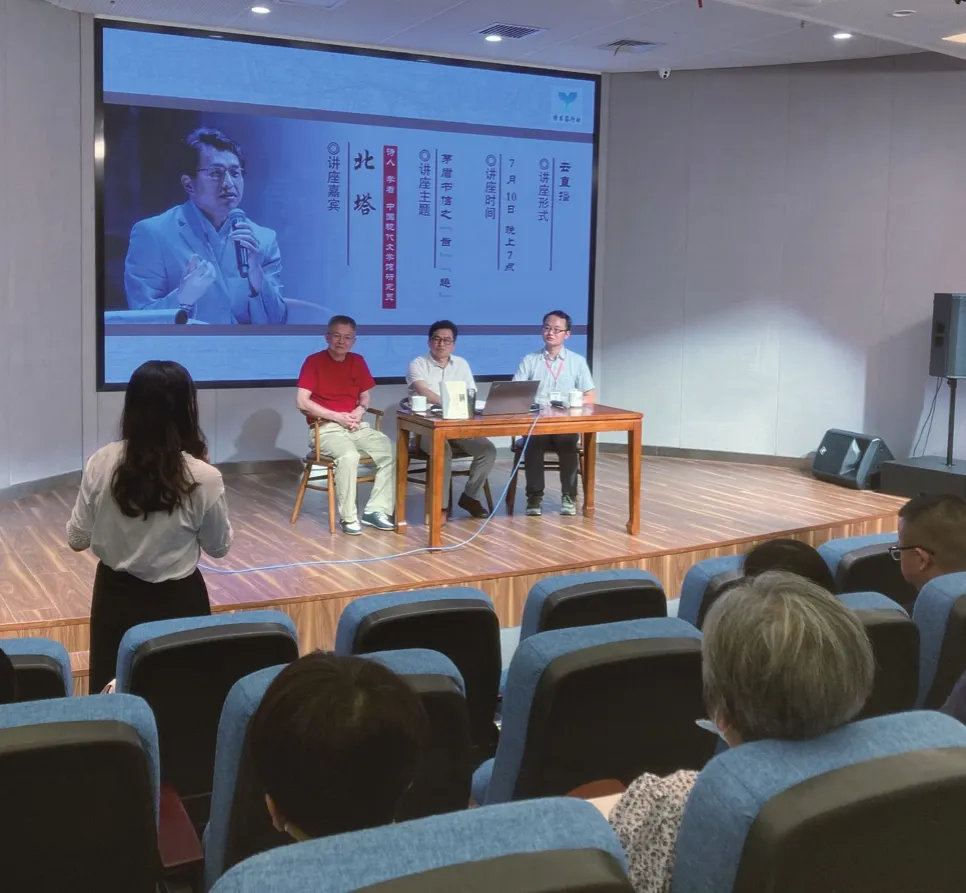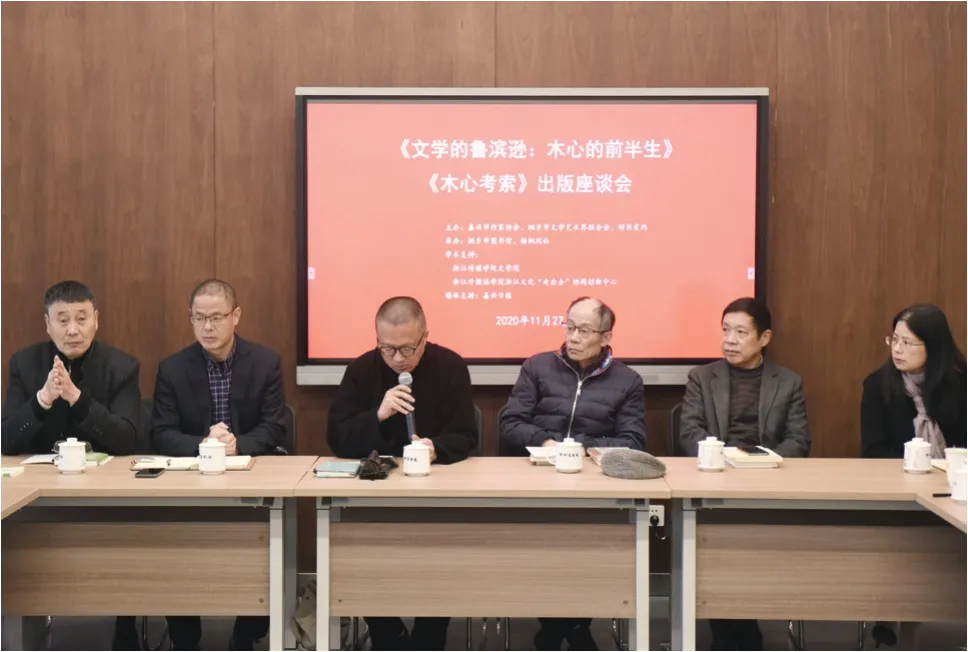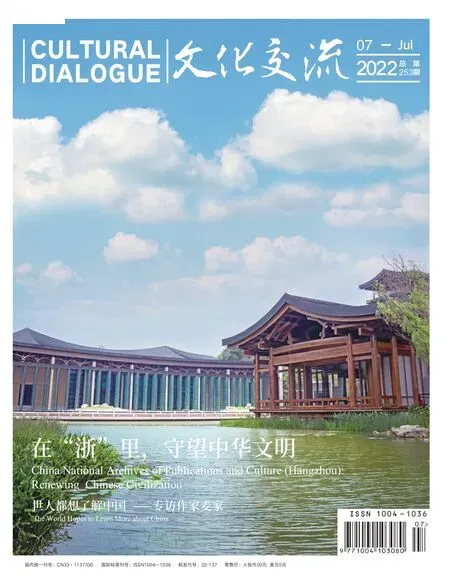夏春锦:守住这份书香
口述/ 夏春锦 记录/许金艳
桐乡市的民间读书社团梧桐阅社,到今年已成立十年了。
用中国阅读学研究会会长徐雁教授的话说:“《梧桐影》(梧桐阅社社刊)聚气藏风,积累了一些人脉,刊登了一些佳作,向社会传播了一些崇文好书的理念。”
桐乡市文化底子好,有充沛的文化资源,有绵延不绝的文脉相承。而来自民间的力量在继续谱写着桐乡的阅读史,也在守住这份书香。
十岁的梧桐阅社的凝聚力强大,桐乡的读书爱好者都愿参加,难得的是,这一群读书人通过《梧桐影》也和国内读书圈活色生香地联系了起来。“与‘阅社’有联系的外地读者遍布全国各地,甚至还有海外人士。”
以下为梧桐阅社社长、阅读推广人夏春锦的口述。
这应该就是读书人、爱好者之间的一种互相取暖
我是福建寿宁人,2008年大学毕业后来到桐乡。不止一个人说过,说我比桐乡人还了解桐乡。但这是朋友间的玩笑话,不能当真。
2019年1月,《嘉兴日报》参与主办的“好书有约”授予我“2018年度致敬奖”,授奖词里有一句话说我“因为爱情来到桐乡,又在这座城市的书香与文化中找到归宿”。这应该说是很准确的,也让我很受用。
今年,梧桐阅社成立十周年了。我们编的《梧桐影》也已经出到十六期。
从没想过《梧桐影》能编到十期以上,当时是抱着编一期是一期的心态,现在想想真是一个小小的奇迹。要知道我们是没有固定的经费来源的,也没有经验,没有人脉,用南京大学徐雁教授的话说,“《梧桐影》是没有条件也创造着条件在做”。

夏春锦在其新书发布会上发言。Xia Chunjin speaks at the launch of his new book.
梧桐阅社的成立,最早源自2012年2月的一次书友小聚。张天杰、郁震宏、李春毛和我,被张天杰称作“四个人的圆桌派”。他们三个都是桐乡人,彼此早就认识,我与他们均是初相见。当时张天杰还在读博士,郁震宏供职于中华书局,李春毛是益智书廊的老板,我在一所职业类学校教书。大家的共同点是爱书,也热爱桐乡地方文化。茫茫人海,竟然坐到了一起,第一次见面,不是在高雅的书桌上,而是街头的一家馆子,喝黄酒,聊的话题不离书人书事,很有点酒逢知己千杯少的意思。
正是这次小聚,让我们觉得这样的机会实在难得,遂萌生了创建一个桐乡书友QQ群的想法,名叫“桐城书友荟”。第一个加入的是张天杰,陆续加入的书友有20余人,为吸引更多的书友参与其中,我拟写了一则“桐城书友荟英雄帖”发到群里,并挂到博客中。
很多人说读书是很个人的事情,这句话没有错,自己读书,那当然就是自己的事情。你读一本书,就是与作者对话,跟别人都不搭界的。可是你读完以后,有所得的时候,发现快乐的时候,就有一种分享的冲动了。
2012的5月12日,这个时间我记得非常清楚,11个书友第一次聚在一起,商讨要成立一个读书会。丰子恺先生漫画里有句话,“今夜故人来不来,教人立尽梧桐影”。我们这个读书会的名称就叫梧桐阅社,我们办的刊物就叫《梧桐影》。
由QQ群到梧桐阅社,再到《梧桐影》,现在感觉一切都是水到渠成的样子。办到现在,应该说在全国读书界的小圈子里还是颇有反响的,这应该就是读书人、爱好者之间的一种互相取暖。
阅读推广可以和脚下这片土地密切联系
在提倡全民阅读的大背景下,各种各样的读书会全国各地都有,但梧桐阅社有它的独特性。第一,完全是民间自发的;第二,纯粹的公益性;第三,与地方文化研究和推广紧密结合。
我们有一社,一刊,一沙龙(讲会),一文丛。
所谓“一社一刊”是最先达成的。沙龙是“伯鸿悦读沙龙”,讲会则是张天杰发起和引入的,也是他主持的。他本人是国学研究者和推广者,有这方面的学识和经验,一直希望以所学造福桑梓。
编文丛是我的创意,2015年主编了“传贻文丛”。内容比较杂,却是桐乡写作者每人以一册书的规模首次集体亮相。
我们过去也以桐溪书院的名义开展过国学讲会,目前正在与相关机构合作创办洛溪书院,希望在“双减”的大背景下,搞一点国学教育和乡土文化教育,来补充学校教育和家庭教育的不足。
梧桐阅社无论是活动还是书刊,都紧紧围绕桐乡展开。我有一个认识,阅读推广可以和脚下这片土地密切联系,更何况桐乡的名人名著不仅仅是桐乡的,还是全国的,甚至是世界的,历代名人的著作不少具有经典品质,有着得天独厚的条件和丰厚的资源。因为接地气,所以本地人读起来更亲切,更来劲,这是非常值得推广的。
《梧桐影》走到今天,靠的也是读者的这种支持,还有作者的支持。
书人合一,是非常有意思的事情
有前辈说过,杂志要编得好,编者得是个杂家。
我本来就是一个喜欢书、爱读书的人,但总觉得个人的世界还是太有局限性,也太小。到桐乡后,梧桐阅社和《梧桐影》成为我走向更广阔的读书世界的一个契机。
湖州有位老先生叫徐重庆,当地无论是年长的还是年幼的,大家都称他为先生。他是一个传奇的民间文化人士,跟外界的交流也是很多的,包括跟茅盾也有来往。
他在世的时候,我曾经去拜访过他,他住在他的“人间过路书斋”,家里最好的位置都让给了书。
还有出版家钟叔河先生和画家陈丹青先生,对我们一直很关注,《梧桐影》的定位得到过他们的认可,这对我们是极大的鼓励。
跟这些人交往,你不单单去读他们的文章,还能够领略到他们的风采,书人合一,是非常有意思的事情。
现在很多人都觉得我是一个研究木心的人,其实这也是跟我们这个杂志有关。
《梧桐影》办到第五期的时候,我们其中一个编委提出来,是不是应该给木心编一期纪念专辑。作为主要的编者,而且也是一个有史料癖的人,我觉得在这样一本故乡读者做的纪念专辑里,应该给木心整理一份年表性质的东西。

“《诗经》里的家常草木—郁震宏新书《诗经草木》分享会”在桐乡市新华书店举行。An event featuring Plants in the Classic of Poetry, a book by Yu Zhenhong, is held at the Xinhua Bookstore in Tongxiang city.
就是这样一个机缘,我把木心的著作买来,大致翻了一遍,整理了一万字左右的一个生平纪要,放在这一期里面。
通过这样一次阅读,我发现木心的有些作品还是很有感觉的,比如那篇《童年随之而去》。可以说,我是通过了解木心生平这样一个切入点,读懂了木心相对写实的一批作品。《梧桐影》“木心纪念专辑”的编印直接促发了我对木心的研究。
有人说,我们是在书写桐乡的阅读史
我也觉得梧桐阅社和桐乡的读书传统是一脉相承的。
抱团读书是读书人的一个传统,在文化氛围浓厚的江南,更是如此。结社在桐乡是有传统的,从两宋直至民国,桐乡境内常有文人结社。
像濮院的聚桂文会,元代时就已经很有名了。当时,濮氏家族邀请文坛领袖杨维桢到濮院来主持聚桂文会,通过他的影响力,号召一批江南的文人参与其中,影响非常大。
吕留良发起的澄社,最多的时候,江南有千余人参与其中,影响力也是非常大的。
离我们近一点的茅盾、丰子恺、孔另境、钱君匋、金仲华等,这些人都是互相有来往的,也有合作,彼此也互相影响。20世纪一二十年代,茅盾、沈泽民等还成立过桐乡青年社。
桐乡的书香底蕴深厚,还能从桐乡人长久不衰的藏书与著述之风中看得出来。这里自古以来就有文人学士藏书、读书、著述的传统。
我也常说,一两百年以后,人家回过头来看我们这个读书群体,应该也是蛮有意思的。我们这个群体的人数和桐乡百万人口的基数比起来,是不多的,但和其他地方读书群体比起来,又觉得是不少的。我们的社友,每个人都有一技之长,都有自己的研究方向和研究成果。有人说,我们是在书写桐乡的阅读史,也是和桐乡结社传统的一种呼应。
我们不能轻视小镇文学
我一直觉得桐乡的读书人是可爱的,也是可信的。桐乡文化底蕴深厚,读书人多,老中青少各年龄段都有,还有代表性人物。他们分布于各个年龄层,有不同的职业,但队伍整齐,人数多,非常难得,特别是老先生有很好的垂范作用,大家容易被带动起来。
桐乡本地的师友,很多人都从事桐乡地方文化文史的研究和整理,像这样一个群体,像这一代桐乡文化的研究者,可以把他们称为桐乡文脉的守望者。
地方文脉的传承,研究肯定是重要的一种手段,在研究中传承,在研究中弘扬。
这几年大家也经常说起小镇文学。以前,木心他们在乌镇办过油印物《泡沫》,濮院现在有份办了三十多年的《梅泾文学》,崇福的叫《崇德文苑》。
我觉得不能轻视小镇文学,茅盾不是从小镇出来的吗?丰子恺不也是从小镇出来的吗?木心也是从小镇出来的。茅盾在乌镇的时候,丰子恺在石门的时候,木心在乌镇的时候,他们通过周边的亲友,特别是通过大量的课外阅读,打开了视野。他们个个都是书虫,都非常热爱书籍,读了大量的书,而且非常有意思的是他们在合适的年龄都读到了比较合适的读物。应该说是小镇滋养了他们。
这些大家是小镇文学最重要的一部分。某种意义上,他们是小镇文学的最高结晶。我们不能轻视小镇文学,也不能够轻视一个小镇上出现的读书的刊物或者说文学的刊物。
我现在在图书馆工作了,朋友说我是老鼠掉到米缸里。现在主要负责地方文献这一块。文学也好,阅读也好,对于我来讲就是一种生活方式。
我们努力工作,努力赚钱,当然是要吃饭,要有房子住,可是吃饱了饭,房子也有了,难道就满足于这些了吗?还是要寻找一点能够填补自己内心空白的东西。
有句话说,你若读书,风雅自来。我想说,风雅莫过于读书。我理解的风雅,是风度,是风神,是一种文艺的生活方式,是诗意的栖居。

在“桐乡记忆”乡土文化沙龙第十五期上,中国现代文学馆研究馆员、诗人北塔主讲《茅盾书信之“旨”“趣”》。Xu Weifeng, a poet and literary researcher also known as Bei Ta, delivers a lecture on Mao Dun’s letters in the 15th session of a lecture series in Tongxiang.
A Decade of Action: Creating and Embracing a Reading Community in Tongxiang
Narrated by Xia Chunjin Transcribed by Xu Jinyan
, Shadow of Wutong,
In 2008, fresh out of college, I came to Tongxiang. A nonnative, I have been jokingly described as being more local than the locals. The story of the club all started in February 2012 when four book-lovers, Zhang Tianjie, Yu Zhenhong, Li Chunmao and me, though with different occupations, got together at a restaurant because of our shared love for reading and local culture.We chatted heartily about our common hobby over cups of yellow wine. Out of the gathering grew the idea to create a group chat for local readers on QQ, an instant messaging software service. Its first member was Tianjie followed by 20 more. In order to attract more members, I wrote a recruitment letter and posted it in the group chat and on Sina blog, the Chinese blogging platform.
On May 12, eleven members met for a kick-off discussion about starting a reading club. The names of the club and its journal were inspired by a cartoon caption by Feng Zikai (1898-1975), a pioneering Chinese cartoonist.
In January 2019 I was granted the 2018 Annual Tribute Award from. In the award speech, the speaker introduced me as someone who had moved for love to Tongxiang whose favorable reading environment and abundant culture gave him a strong sense of belonging.
The year of 2022 witnesses the club journal’s sixteenth issue,an achievement we never thought would be possible when faced with a lack of funds, skills and connections from the beginning.The success of the journal, in the words of Prof. Xu, is a real-life example of making the impossible possible.
Looking back, I feel like almost everything came naturally whenever circumstances were right. Today, the club has become influential in its kind around China, a testament to what is possible when readers come together in a spirit of partnership.
China’s nationwide reading campaign has given birth to various book clubs across the land. Ours is unique in that it is a non-profit entity for the study and promotion of local culture. The club features a journal, an anthology and regular lectures. The journal came first followed by the lectures initiated and hosted by Tianjie who had always hoped to contribute to his hometown with his expertise in Chinese studies. Presently we are making cross-organizational efforts to establish a new academy for incorporating both Chinese studies and local culture into learning,as a complement to classroom teaching and family education. The anthology was my idea. In 2015, I edited, nine of which were by nine local authors.
Our activities and publications center on Tongxiang because I believe advocacy for reading should go hand in hand with local culture promotion, especially when the city boasts literary celebrities and great literary works. The practice of producing culturally relevant literature is an effective way to engage people in reading, as proved by the positive responses from local readers.The concerted efforts of readers and writers have made our journal what it is today.

“《文学的鲁滨逊:木心的前半生》《木心考索》出版座谈会”在桐乡市图书馆举行。A publishing event on Mu Xin is held at Tongxiang Municipal Library.

在乡土文化沙龙第三期上,由陈勇主讲《漫话清代乌镇进士陆以湉》。Chen Yong delivers a lecture on Lu Yitian, a Qing dynasty scholar of ficial from Tongxiang.
My roles at the club have introduced me to a vast range of writers. Mr. Xu Chongqing, from Huzhou city, Zhejiang province,was one such example. The respectable scholar of folk culture was in close contact with lots of eminent people in the cultural field.His home packed with books left me a deep impression after paying him a visit. Besides, the publisher Zhong Shuhe and the artist Chen Danqing, who support our positioning strategies for the club journal, have given constant attention to its development,which is a tremendous encouragement for us.
In preparation for the fifth issue of the journal, an editorial board member proposed that we do a commemorative issue dedicated to Mu Xin (1927-2011), an artist and writer born in Wuzhen, a historical town of Tongxiang. I subscribed to the proposal largely because it would generate a special edition made by Mu’s fellow readers. Just like that, I started reading his books,based on which I wrote a ten-thousand-word chronological narrative of his life for the journal. The whole experience provided me with an entry point through which I was able to understand some of his realistic works, thus exploring his literary world.
Reading has brought me closer to varied writers, which has been a truly fascinating journey.
In my view, what we have been doing at the club is to carry on the city’s reading tradition. Organizing literary groups has been a time-honored practice predominantly found among the literati in the regions south of the Yangtze River, like Tongxiang,from the Song dynasty (960-1279) up to the Republican era(1912-1949). A typical example is the literary society organized by the Pu Clan in the Yuan dynasty (1206-1368), who invited a prominent scholar to lead the community. His followers came in great numbers, making it an influential one at its time. Another noteworthy group, initiated by the poet Lyu Liuliang (1629-1683),boasted over one thousand members at its peak time.
In the 1920s, the novelist Mao Dun (1896-1981) and his younger brother Shen Zemin (1900-1933) set up the Tongxiang Youth Society. Mao and other notable literary figures’ collaborative pursuits exerted influence upon each other.
The total number of our club members is small, compared with the one million population of Tongxiang, but big enough compared with its counterparts in China. As experts in their own fields, our members all have participated in shaping the reading history of Tongxiang, paying homage to the rich legacy of the land.
Tongxiang has a large number of readers across various age and occupation groups, among whom senior scholars have acted as positive role models. Besides, many of my friends and teachers here are researchers on local culture and literature history, who constitute a generation of heritage guardians.
In recent years, small town literature, a genre that well deserves attention, has been a popular topic. Publications of this kind can be found in Tongxiang’s small towns like Wuzhen,Puyuan and Chongfu. Writers of big influence including Mao Dun, Feng Zikai and Mu Xin have broadened their horizons through extensive and age-appropriate reading in their hometowns. In a sense, they represent the quintessence of this type of literature, whose role and that of the publications should never be underestimated.
Luckily, I now work at a library responsible for the local studies collection. Reading has become my way of life. We all work hard for food and shelter, but is that all? How about going beyond those basic needs and doing something more to fill the emptiness in our hearts?
For me, reading is the road to grace and elegance, not only in terms of manners, but also to add poetic charm to our lives.

